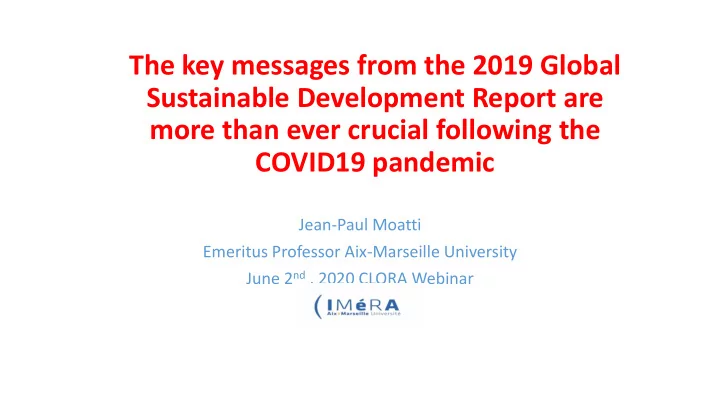

The key messages from the 2019 Global Sustainable Development Report are more than ever crucial following the COVID19 pandemic Jean-Paul Moatti Emeritus Professor Aix-Marseille University June 2 nd , 2020 CLORA Webinar
The GSDR Independent Group of Scientists (IGS) Gonzalo Hernández Licona Amanda Katherine David Smith Glassman Richardson Peter Jurgis Endah Muhammad Messerli Jean-Paul Staniskis Eun Mee Murniningtyas Saidam Moatti Kim Jean-Pascal Parfait van Ypersele Wolfgang Ekoundou- Eeva Furman Ernest Foli Lutz Enyegue
GSDR 2019 Key Messages • It is time to sound the alarm • Better focus on the arrows than on the boxes • Mobilize the billions and shift the trillions • Promote sustainability science
Impact of COVID19 on extreme poverty (UNDP) 40/60 million additional people in extreme poverty
Increased inequalities due to the pandemic
Multidimensional impact of the pandemic on SDGs
Differential epidemiological and economic impacts of COVID19
Some paradoxical pandemic im impacts - Advanced countries have been more hardly hit (for both health and economic impacts) - But long term recovery will be more difficult in LIC, LMIC ans SIDS % changes in output (IMF projections) 2019 2020 2021 World Output + 2.9 - 3.0 + 5.8 Advanced Economies + 1.7 - 6.1 + 4.5 Eurozone + 1.2 - 7.5 + 4.7 Emerging and Developing Economies + 3.7 - 1.0 + 6.6 South-East Asia + 5.5 + 1.0 + 8.5 Sub-Saharan Africa + 3.1 - 1.6 + 4.1
Implementation of Agenda 2030 : Mobilizing the billions, Shifting the trillions • Total world investment in 2019 (IMF) = • Annual funding gap until 2030 for 22.8 trillion US$ sustainable development in developing countries (UNDP) = 11.5 in advanced economies 2.5 trillion US$ 11.3 in emerging and developing economies • World total subsidies for fossil fuels in 2018 (IMF)= • Foreign Direct Investment in 2018 400 billion (direct)/ 5.3 trillion (indirect)US $ (UNCTAD) = 1.43 trillion US$ • 2015 annual commitments of advanced 0.67 in developing countries countries for climate finance toward developing countries = • Total ODA (OECD/DAC) in 2018 = 0.1 trillion US$ • Total volume of Exchange-trading funds = 0.15 trillion US $ • Public Development Finance Institutions 3.5 trillion US$ Investment in 2018 = • Total assets of world private finance = 1.9 trillion US$ 413 trillion US$
6 Entry points (nexus) for sustainable change > Ticking 169 boxes 24 sept 2019 11
Post-COVID19 Recovery ry : : which alternative for SDGs ?
Promoting « Sustainability Science » A Major Need for Global South An Emerging Field 13
Pro romoting sustainability scie ience & in innovation • “The attempt, by sustainability science, to understand the integrated “whole” of planetary and human systems requires cooperation between scientific, social and economic disciplines, public and private sectors, academia and government. In short it requires a massive global cooperative effort and one major task of sustainability science is to assist integrated cross-disciplinary coordination ” US NAAS, 2001 a) Understanding complex causal chains b) Understanding interactions (-/+) between policies for individual SDGs c) Solution and innovation oriented including “reverse innovation” d) Participatory sciences e) SDGs as the unique framework for science/policy interface
Priority for sustainability science : strengthening scientific capacities and expertise in developing countries, in particular in Africa
Le GSDR: feuille de route de l’interface science/politique d’ici 2030 • https://sustainabledevelopment.un.org/gsdr2019
Recommend
More recommend